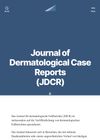1 citations,
July 2021 in “IntechOpen eBooks” Environmental factors can cause mutations in skin proteins, leading to skin disorders.
7 citations,
January 2012 in “International journal of trichology” Permanent hair removal with lasers may cure itchy black hair bristles on the back.
 April 2024 in “JCT research” July 2000 in “The Pediatric Infectious Disease Journal”
April 2024 in “JCT research” July 2000 in “The Pediatric Infectious Disease Journal” Tinea faciei should be considered in neonatal vesicular lesions and confirmed with KOH examination and culture.
309 citations,
October 2007 in “Biomaterials” Keratin from human hair helps nerves heal faster.
29 citations,
October 2017 in “Journal of proteomics” The research found specific proteins that affect fiber characteristics and hair growth in sheep and goats.
29 citations,
May 2007 in “International journal of pharmaceutics” Different compounds move through artificial sebum at different rates, which can help choose the best ones for targeting hair follicles.
 25 citations,
December 2008 in “Journal of Dermatological Case Reports”
25 citations,
December 2008 in “Journal of Dermatological Case Reports” Skin color may change how alopecia areata looks under a dermoscope.
24 citations,
January 2012 in “Journal of natural science, biology and medicine” Tinea capitis is common among Kolkata school children, especially boys, and hygiene doesn't greatly impact infection rates.
23 citations,
February 2015 in “The American journal of pathology” Keratosis pilaris is often linked to genetic mutations and causes skin and hair abnormalities, regardless of those mutations.
8 citations,
January 2017 in “Indian dermatology online journal” Traumatic anserine folliculosis is a skin condition caused by friction, treatable with topical cream and avoiding trauma.
 7 citations,
January 1981 in “Springer eBooks”
7 citations,
January 1981 in “Springer eBooks” Certain small molecules and polymers can change hair's physical properties and how it feels by affecting the bonds within the hair.
5 citations,
January 2016 in “Indian dermatology online journal” A 25-year-old man with multiple skin tumors was successfully treated with acitretin and methotrexate.
2 citations,
August 2022 in “Viruses” Skin cancer often starts from Lgr5+ progenitor cells.
 1 citations,
July 2023 in “Forensic science international. Genetics”
1 citations,
July 2023 in “Forensic science international. Genetics” Hair protein analysis might help identify a person's ethnicity, sex, and age in forensics.
 1 citations,
February 2022 in “Biological Trace Element Research”
1 citations,
February 2022 in “Biological Trace Element Research” The combination of Arginine Silicate Inositol Complex and a new form of Biotin improved hair and nail growth in rats.
 February 2023 in “JAAD case reports”
February 2023 in “JAAD case reports” Reducing immunosuppression and using antiviral creams improved the woman's skin condition.
 January 2023 in “Turk Dermatoloji Dergisi”
January 2023 in “Turk Dermatoloji Dergisi” Injecting a cell suspension from hair follicles increased hair density in a balding patient.
January 2019 in “Springer eBooks” Sebaceous glands play a key role in skin health and conditions like acne.
September 2022 in “Asian Journal of Surgery” 76 citations,
January 2011 in “Indian Journal of Dermatology/Indian journal of dermatology” Dermoscopy is a useful tool for diagnosing and managing alopecia areata.
37 citations,
October 2015 in “PeerJ” Perming significantly changes hair's molecular structure, while shampoo and conditioner do not.
10 citations,
December 2020 in “Palaeogeography, palaeoclimatology, palaeoecology” Elephant tusks and hair reveal seasonal diet and climate changes.
5 citations,
January 2015 in “Case reports in medicine” A baby was diagnosed with IFAP syndrome due to a new genetic mutation, showing severe skin and developmental issues.
 2 citations,
June 2023 in “Skin Research and Technology”
2 citations,
June 2023 in “Skin Research and Technology” Yellow dots and short vellus hairs are the most common signs of Alopecia Areata (AA), and trichoscopy can help diagnose AA and track treatment progress.
2 citations,
July 2019 in “Cosmetics” Beautiful hair is flexible and elastic due to its unique double-layered structure and can be enhanced with succinic acid treatment.

Tumid lupus erythematosus can cause non-scarring hair loss on the scalp and requires careful diagnosis.
 September 2024 in “Indian Journal of Dermatology”
September 2024 in “Indian Journal of Dermatology” Trichoscopy effectively diagnoses and assesses the severity of androgenetic alopecia.
 April 2024 in “Cosmetics”
April 2024 in “Cosmetics” Different oils affect hair flexibility and strength, with their impact varying on whether hair is virgin or bleached.
 April 2024 in “Clinical dermatology review (Print)”
April 2024 in “Clinical dermatology review (Print)” Trichoscopy is an effective, noninvasive method for early diagnosis of Female Pattern Hair Loss.











